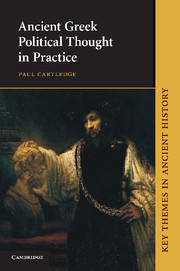Book contents
- Frontmatter
- Contents
- Preface
- Acknowledgements
- Timeline
- CHAPTERS AND NARRATIVES
- 1 Meaning in context: how to write a history of Greek political thought
- 2 The Greek invention of the polis, of politics and of the political
- Narrative I The prehistoric and protohistoric Greek world, c. 1300–750 BCE
- Narrative II The archaic Greek world, c. 750–500 BCE
- 4 Rule by some: the politics of Solon, c. 600 BCE
- 5 Rule by all: the Athenian revolution, c. 500 BCE
- Narrative III The classical Greek world I, c. 500–400 BCE
- Narrative IV The classical Greek world II, c. 400–300 BCE
- Narrative V The Hellenistic Greek world, c. 300–30 BCE
- Narrative VI ‘Graecia capta’ (‘Greece conquered’), c. 146 BCE – CE 120
- APPENDIX I Selected texts and documents
- APPENDIX II The ‘Old Oligarch’: a close reading
- Bibliographical essay
- References
- Index
4 - Rule by some: the politics of Solon, c. 600 BCE
Published online by Cambridge University Press: 05 June 2012
- Frontmatter
- Contents
- Preface
- Acknowledgements
- Timeline
- CHAPTERS AND NARRATIVES
- 1 Meaning in context: how to write a history of Greek political thought
- 2 The Greek invention of the polis, of politics and of the political
- Narrative I The prehistoric and protohistoric Greek world, c. 1300–750 BCE
- Narrative II The archaic Greek world, c. 750–500 BCE
- 4 Rule by some: the politics of Solon, c. 600 BCE
- 5 Rule by all: the Athenian revolution, c. 500 BCE
- Narrative III The classical Greek world I, c. 500–400 BCE
- Narrative IV The classical Greek world II, c. 400–300 BCE
- Narrative V The Hellenistic Greek world, c. 300–30 BCE
- Narrative VI ‘Graecia capta’ (‘Greece conquered’), c. 146 BCE – CE 120
- APPENDIX I Selected texts and documents
- APPENDIX II The ‘Old Oligarch’: a close reading
- Bibliographical essay
- References
- Index
Summary
Aristocracy, n. Government by the best men. (In this sense the word is obsolete; so is that kind of government.)
(Ambrose Bierce, A Devil's Dictionary, 1911)Nothing appears more surprising to those who consider human affairs with a philosophical eye than the easiness with which the many are governed by the few.
(David Hume, ‘First principles of government’, Essays, 1742)Democracy, ancient-Greek-style, is probably the most key theme of my ‘key theme’. It could hardly be more acutely topical. In Myanmar today, for instance, ordinary people are literally dying for democracy, or what is counted as democracy nowadays. At all events, they want something the opposite of what they have, a military junta, which is what the Greeks would have called a dunasteia or non-responsible collective tyranny. In the longer-established of the modern democracies, however, the very fact of democracy is somewhat old hat or vieux jeu. Perhaps indeed it is only at its instauration that democracy really tastes ‘sweet’, to use a political metaphor current among the ancient Greeks themselves (Herodotus 7.135.3). When exactly should we date its instauration, though?
I realise that from another – globally comparative – point of view (Detienne 2007) the date at which democracy was first invented in the world may seem relatively unimportant. From my point of view, however, concerned as I am with the relationship between ideas and practice in ancient Greece, where as a matter of fact democracy was first invented, it is of the greatest moment to try to find out when that happened.
- Type
- Chapter
- Information
- Ancient Greek Political Thought in Practice , pp. 46 - 54Publisher: Cambridge University PressPrint publication year: 2009



